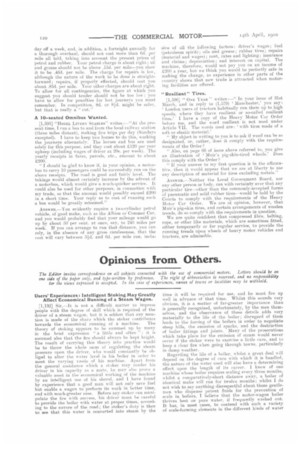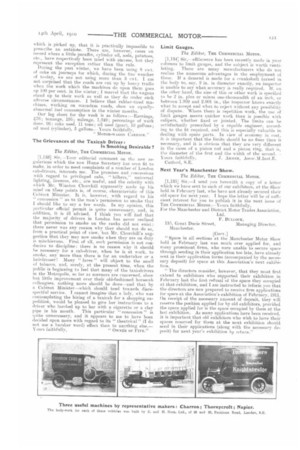Opinions from Others.
Page 18

Page 19

If you've noticed an error in this article please click here to report it so we can fix it.
The Editor invites correspondence on all subjects connected with the use of commercial motors. Letters should be on one side of the Paper only, and type-written by preference. The right of abbreviation is reserved, and no responsibility for the views expressed is accepted. In the case of experiences, names of towns or localities may be withheld.
Users' Experiences Intelligent Stoking May Greatly Affect Economical Running of a Steam Wagon.
[1,132] Sir,—lt is not a difficult matter to impress people with the degree of skill which is required of the driver of a steam wagon, but it is seldom that any mention is made of the share which time stoker contributes
towards the economical running of a machine. The theory of stoking appears to be summed up by many in time brief expression " a little and often " it is assumed also that the fire should always be kept bright. The result of carrying this theory into practicewould be to throw the whole onus of regulating the steam pressure upon the driver, who would constantly he obliged to alter the water level in his holler in order to meet tho varying needs of his machine. Apart from the general assistance which a stoker may render his driver in his capacity as a mate, he may also prove a valuable asset in the economical working of the machine by an intelligent use of his shovel, and I have found by experience that a good man will not only save fuel but enable a. wagon to perform its work in better time, and with much-greater ease. Before any stoker can manipulate the fire with success, his driver must be careful to provide the boiler with water at proper times, according to the nature of the road ; the stoker's duty is then to see that this water is converted into steam by the time it will be required for use, and he must fire up well in advance of that time. Whilst this sounds very obvious, it is a matter of far-greater importance than is generally recognized, unfortunately, by the men themselves, and the observance of these details adds very materially to the life of the boiler ; disregard of thorn leads to the forcing of time boilers in order to negotiate steep hills, the emission of sparks, and the destruction of boiler fittings and joints. Many of the prosecutions which take place for the emission of steam would never occur if the stoker were to exercise a little care, and to keep a clear fire when going through towns, particularly in damp weather. Regarding the life of a boiler, whilst a great deal will depend on the degree of care with which it is handled, the nature of the water used will also have a determining effect upon the length of its career. I know of one machine whose boiler requires scaling every three months, whilst a comparatively-short distance away, a boiler of identical make will run for twelve months; whilst I do not wish to say anything disrespectful about those gentlemen who dispense patent fluids for the prevention of scale in boilers, I believe that the motor-wagon boiler thrives best on pure water, if frequently washed out. It has, in most cases, to contend with such a variety of scale-forming elenments in the different kinds of water which is picked up, that it is practically impassible to prescribe an antidote. There are, however, eases on record where a. little paraffin, cylinder oil, soda, potatoes, etc., have respectively been tried with success, but they represent the exception rather than the rule.
During the past winter, we have been using 8 cwt. of coke on journeys for which, during the tine weather of to-day, we are not using more than 3 cwt, I am not surprised that the roads are cut up by heavy traffic when the work which the machines do upon them goes up 100 per cent. in the winter ; I marvel that the wagons stand up to their work as well as they do under such adverse circumstances. I believe that rubber-tired ma(Alines, working on macadam roads, show an equallyabnormal fuel consumption in the winter mouths.
Our log sheet for the week is as follows :—Earnings, MOTOR-WAGON CARRIER." The Grievances of the Taxicab Driver : Is Smoking Desirable The Editor, THE COMMERCIAL MOTOR. 11.1:33] sir, • -Your editorial comment on the new regulations which the new Rome Secretary has seen fit to make, in order to meet complaints of a number of London cab-drivers, interests me. The promises and concessions with regard to privileged cabs, " bilkers," universal lighting, licences, etc., are useful, and the celerity with which Mr. Winston Churchill apparently made up his mind on these points is, of course, characteristic of this Cabinet Minister. It is, however, with regard to his " concession " as to the men's permission to smoke that I should like to say a few words. In my opinion, this particular official permit is quite unnecessary, and, in addition, it is ill advised. I think you will find that the majority of drivers in London has never realized that permission to smoke on the ranks did not exist: there never was any reason why they should not: do so, from a practical point of view, but. Mr. Churchill's suggestion that they may now smeke when they are on duty is mischievous. First of all, such permission is not conducive to discipline: there is no reason why it should be necessary for a cab-driver, when he is at work, to smoke, any more than there is for an undertaker or a hairdresser! Many " fares " will object to the smell of tobacco, and, surely, at the present time, when the public is beginning to feel that many of the taxi-drivers in the Metropolis, so far as manners are concerned, show but little improvement over their old-fashioned horsecab colleagues, nothing more should be done—and that by a Cabinet Minister—which should tend towards disrespectful service. I cannot imagine that a lady, who was contemplating the hiring of a taxicab for a shopping expedition, would be pleased to give her instructions to a driver who lurched up to her with a cigarette or a clay pipe in his mouth. This particular " concession" is quite unnecessary, and it appears to me to have been decided upon more with regard to its " theatrical" (I do not use a. harsher word) effect than to anything else.— Yours faithfully, " OWNER or FIVE." Limit Gauges. The Editor, THE COMMERCIAL MOTOR. L1,134] Sir,ellference has been recently made in your columns to limit gauges, and the subject is worth ventilating. There are many manufacturers who do not realize the numerous advantages in the employment of these. If a demand is made for a crankshaft turned in the body to, say, 2 in. in diameter exactly, an inspector is unable to say what accuracy is really required. If, on the other hand, the size of this or other work is specified to be 2 in. plus or minus one-thousandth of an inch, or between.1.999 and 2.001 in., the inspector knows exactly what to accept and what to reject without any possibility of dispute. Where there is repetition work, the use of limit gauges means quicker work than is possible with calipers, whether fixed or jointed. The limits can be satisfactorily prescribed by a capable engineer, according to the lit required, and this is especially valuable in dealing with spare parts. In view of economy in cost, it is important that the limits should be no finer than is necessary, and it is obvious that they are very different in the cases of a piston rod and a piston ring, that is, the diameter of the first and the width of the second. lours faithfully, Catford, S.E. J. ARM ER, A 6Si-se. M.lust.E. Next Year's Manchester Show. The Editor, THE COMMERCIAL MOTOR. [1,135] Sir,-1 send you herewith a copy of a letter which we have sent to each of our exhibitors, at the Show held in February last, who have not already secured their old space for next year. I hope the letter will be of sufficient interest for you to publish it in the next issue of THE COMMERCIAl. MOTOR.— Yours. faithfully, For the Manchester and District Motor Trades Association, Ltd. F. But.i.ocE, 131, Great. Dune Street, Managing Director. Manchester, Leory.1 "Space in all sections at tile Manchester Motor Show held in February last was much over applied for, and many prominent firms, who were unable to secure space through sending in their application too late, have already sent in their application forms (accompanied by the necessary deposit) for space at this Association's next. exhibition. " The directors consider, however, that they must first extend to exhibitors who supported their exhibition in February last the first refusal of the space they occupied at that exhibition, and I am instructed to inform you that the directors are now prepared to receive firm applications for space at the Association's exhibition of February, 1911. On receipt of the necessary amount of deposit, they will reserve the pc/sition applied for by old exhibitors, provided the space applied for is the space occupied by them at the last exhibition. As ninny applications have been received, it is important that old exhibitors who wish to have their spaces reserved for them at the next exhibition should send in their applications (along with the necessary deposit) for next year's exhibition by return."






















